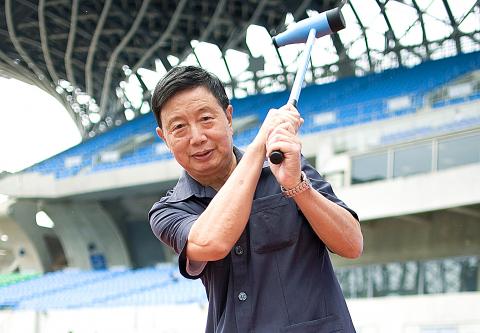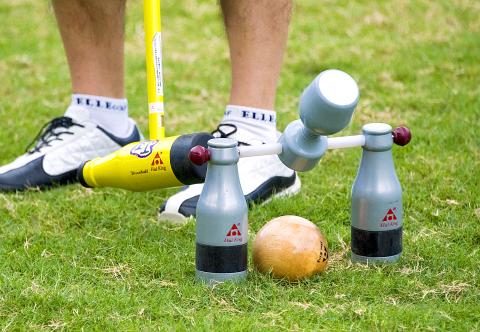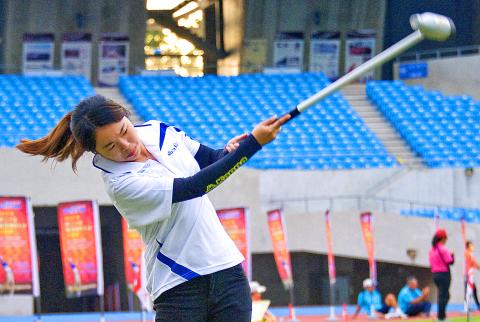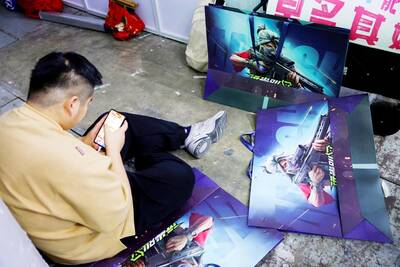If someone aimed to conquer the world with a golf-like sport that uses equipment modeled after beer bottles and wine glasses, Weng Ming-hui (翁明輝) would be the person to do it.
Ever since he was a child, Weng wanted to do something remarkable, comparing his ambition to “hunting deer in the central China plains,” an idiom for fighting to seize the imperial throne.
Weng studied politics in college, but because of hearing problems, he gave up his dream of becoming a politician and instead became a wealthy businessman.

Photo: Han Cheung, Taipei Times
“I knew there was always going to be someone who made more money than me, and that my chances of leaving my name in history was becoming slimmer,” the 73-year-old says. “I was resigned to live the life of a nobody … until I invented woodball.”
WOODBALL EMPIRE
Weng sits in the VIP room at Kaohsiung National Stadium, chatting with regional leaders of the International Woodball Federation, which now encompasses more than 40 countries and territories.

Photo: Han Cheung, Taipei Times
The floor-to-ceiling windows provide a clear view of the playing grounds, where young students and elderly women alike are competing in the 20th Taiwan Open International Championship, a competition that Taiwan excelled at.
Woodball is a simple sport. Often dubbed “commoner’s golf,” it requires only three pieces of equipment and no specialized course. Unlike golf, a single mallet is used, the goal being to hit a large wooden ball through a small gate. Superficially, it resembles croquet — which Weng says he had no knowledge about when he designed woodball — but the methods of hitting the ball, playing field and game rules are closer to golf.
Weng conceived of the sport in 1990 and spent two years refining the game, drawing inspiration from everyday objects in his house. The ball, 9.5cm in diameter, is a replica of the spherical decoration on the handrails of the staircase in his house. The mallet head is modeled after a Taiwan Beer bottle, and the gate resembles two bottles with a wine glass in the middle. When the ball passes through the gate, it knocks the wine glass upward — as if you were raising your glass to celebrate a goal.

Photo: Han Cheung, Taipei Times
Players form teams of four to eight, and compete in singles, doubles and mixed doubles competitions. The field is divided into 12 fairways with various obstacles, and like golf, the team needing the fewest strokes to finish the course wins.
Representatives from countries without a woodball association get started by meeting with Weng, and if he approves, the federation will help them with initial equipment and training so they can return home and promote the sport. It seems like Weng got his wish of becoming emperor, after all.
“It’s as if I bestow upon each country the title of woodball king,” he says. “With so many kings, we’re like a woodball empire.”
ANYBODY, ANYWHERE
The federation has an anthem, which begins: “Woodball, the sport that is for everyone, brings us together from all over the world.”
During the Taiwan Open, people of various ages, nationalities and genders could be seen. Most local players seem to be students, as many schools, from elementary to university levels, have official school clubs. But you also have teams formed of retirees.
Chen Kang-hsien (陳港仙), 71, started playing woodball after he retired, discovering the sport through a friend. Weather permitting, he says he practices every day with friends in his community.
“It’s suitable for people my age, because it’s not too intense but not too relaxed, either. You have to walk around a lot and use your brain as well,” he says. “It’s good exercise.”
The long playing career of the sport is one of the reasons Wong Nga Chun (黃雅瑱), of Hong Kong, keeps on playing, many years after she graduated from her college team.
“I feel this is a lifelong sport,” she says. “I can still play when I’m 40 or older.”
This is, by design, Weng’s intention — he is not shy to express his distaste for the government’s focus on the Olympics and the Asian Games, which he says are for an exclusive group of athletes aimed toward winning glory for the country. For Weng, this represents a “small country mindset.”
Unlike golf, Weng says, woodball players don’t need to buy expensive equipment or visit a course. He is against modifying the environment, as all natural obstacles, such as trees, rocks and uneven grounds or slopes are incorporated into the course. The game can even be played on the beach or in the snow, he says.
The sport also doesn’t depend so much on one’s physical condition or abilities, and has little risk of injury. Weng quips that this means people won’t need to resort to doping.
“What I want to promote is a sport for the masses,” he says. “This is what a modern sport should be like. It should be something that makes people healthy and happy, and something that is promoted simply because people like it.”
WORLD DOMINATION
Being the ambitious man that he is, Weng harbors feelings of making a name for Taiwanese on the global stage as well, but on his own terms, with a locally-invented game.
When he first invited people to try woodball in the private garden he built for his father, they kept asking him where the sport originated.
The realization that most Taiwanese play European or American sports inspired Weng to sell his businesses and devote all his time to building his national and international empire.
“Yes, you may win a gold medal in the Olympics, but who really sees it besides people in our own country?” he asks. “If we want to raise national prestige, we have to make a name for ourselves doing our own thing. I don’t want to be the best in the world, I want to be the one and only.”
Weng first expanded into Southeast Asia, where he worked with locals of Chinese descent that he could communicate easily with. With associations in almost every Asian country and territory, he now wants to conquer Africa and South America.
Uganda has been one of Weng’s most trusting African allies, ever since Paul Kayongo met Weng in Dubai in 2008 and became fascinated with the sport. The country has since became Africa’s manufacturer of woodball equipment.
“We are now trying to move out of Uganda and spread to the rest of Africa,” says William Osire, a Central Bank of Uganda employee who plays for his company club.
In March, Weng received a “Most Influential Huaren (華人, ethnic Chinese)” award in Beijing China, alongside HIV treatment pioneer David Ho (何大一) and the Buddhist Compassion Tzu Chi Foundation.
Weng says that instead of visiting other countries, people are starting to seek him out, and he believes that in its third decade, woodball is ready to “take flight.”
Another indication of the game’s success? Weng says counterfeit versions of the official competition mallet have started to appear in the market.

During the Metal Ages, prior to the arrival of the Dutch and Chinese, a great shift took place in indigenous material culture. Glass and agate beads, introduced after 400BC, completely replaced Taiwanese nephrite (jade) as the ornamental materials of choice, anthropologist Liu Jiun-Yu (劉俊昱) of the University of Washington wrote in a 2023 article. He added of the island’s modern indigenous peoples: “They are the descendants of prehistoric Formosans but have no nephrite-using cultures.” Moderns squint at that dynamic era of trade and cultural change through the mutually supporting lenses of later settler-colonialism and imperial power, which treated the indigenous as

By 1971, heroin and opium use among US troops fighting in Vietnam had reached epidemic proportions, with 42 percent of American servicemen saying they’d tried opioids at least once and around 20 percent claiming some level of addiction, according to the US Department of Defense. Though heroin use by US troops has been little discussed in the context of Taiwan, these and other drugs — produced in part by rogue Chinese Nationalist Party (KMT) armies then in Thailand and Myanmar — also spread to US military bases on the island, where soldiers were often stoned or high. American military policeman

An attempt to promote friendship between Japan and countries in Africa has transformed into a xenophobic row about migration after inaccurate media reports suggested the scheme would lead to a “flood of immigrants.” The controversy erupted after the Japan International Cooperation Agency, or JICA, said this month it had designated four Japanese cities as “Africa hometowns” for partner countries in Africa: Mozambique, Nigeria, Ghana and Tanzania. The program, announced at the end of an international conference on African development in Yokohama, will involve personnel exchanges and events to foster closer ties between the four regional Japanese cities — Imabari, Kisarazu, Sanjo and

A town in Japan is to urge all residents to restrict their smartphone use to two hours a day in an attempt to tackle online addiction and sleep deprivation. Officials in Toyoake, Aichi prefecture, said the measure would target not only children but also adults, amid growing concern about the physical and psychological toll excessive smartphone use is taking on people of all ages. The move aims “to prevent excessive use of devices causing physical and mental health issues … including sleep problems,” the mayor, Masafumi Koki said recently. The Toyoake municipal assembly began debating the non-binding ordinance this week ahead of a